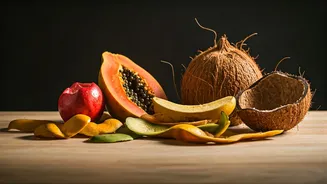Protein Powerhouses Unveiled
Nuts and seeds are nutritional powerhouses, packed with essential proteins, healthy fats, and vital minerals. Protein is crucial for building and repairing
tissues, making enzymes, and supporting overall health. Unlike some protein sources, nuts and seeds also provide beneficial fiber and often contain antioxidants. Their versatility allows them to be easily added to various meals and snacks. Consider using them to enhance breakfast cereals, salads, baked goods, or as a standalone snack. Regular consumption can contribute significantly to a balanced diet and support healthy lifestyle choices. The benefits extend beyond just protein provision; many nuts and seeds contribute to improved heart health and aid in weight management due to their fiber and healthy fat content.
Almonds: Brain Booster
Almonds are not only delicious but also incredibly nutritious, containing a significant amount of protein per serving. They are rich in Vitamin E, an antioxidant that protects cells from damage, as well as healthy fats and fiber, keeping you feeling full and satisfied. A handful of almonds provides a steady release of energy. Studies have shown that almonds can contribute to improved brain health and cognitive function. Their versatility makes them easy to incorporate into your daily routine. Whether you're adding them to your morning oats, blending them into a smoothie, or enjoying them as a quick snack, almonds provide a satisfying and protein-rich boost. They also have the added advantage of being naturally gluten-free, making them a great choice for people with dietary restrictions.
Walnuts: Omega-3 Richness
Walnuts are distinguished by their unique shape and impressive nutritional profile, with a focus on omega-3 fatty acids, which are beneficial for heart and brain health. They're an excellent source of protein and can help contribute to managing cholesterol levels. Adding walnuts to your diet offers an opportunity to improve overall well-being. The omega-3s in walnuts are particularly important for reducing inflammation in the body. You can enjoy walnuts on their own as a snack or add them to salads, baked goods, or yogurt for a satisfying crunch. Including walnuts regularly can support better cognitive function and reduce the risk of chronic diseases.
Chia Seeds: Tiny Titans
Chia seeds are small but mighty, boasting a high protein content along with fiber, omega-3 fatty acids, and various minerals. They are a complete protein, meaning they contain all nine essential amino acids. This makes them a valuable addition to vegetarian or vegan diets. Chia seeds have the ability to absorb water, forming a gel-like consistency. This property contributes to feelings of fullness and aids in digestion. They can be added to smoothies, yogurt, or oatmeal to increase protein and fiber intake. They can also be used as a binder in baked goods, providing a healthy and protein-rich alternative to eggs. The versatility and nutritional value of chia seeds make them a convenient and healthy addition to almost any meal.
Flax Seeds: Fiber Power
Flax seeds are another great source of plant-based protein, as well as a significant amount of fiber and omega-3 fatty acids. These small seeds have a slightly nutty flavor and can be easily integrated into your daily meals. The fiber content aids in digestion and promotes a feeling of fullness, helping to control appetite. Ground flax seeds are easier for your body to digest and absorb nutrients from. Add them to your smoothies, sprinkle them on cereal or yogurt, or use them in baking. Flax seeds also provide lignans, which act as antioxidants and can contribute to various health benefits. Consuming flax seeds regularly can support heart health and improve digestive function.
Pumpkin Seeds: Zinc Boost
Pumpkin seeds, also known as pepitas, are rich in protein and offer a satisfying crunch. They’re a good source of zinc, an important mineral for immune function and overall health. These seeds also contain magnesium, which is essential for muscle and nerve function. Pumpkin seeds have a slightly nutty flavor that makes them a great addition to various dishes. You can roast them for a crispy snack or add them to salads, trail mixes, or baked goods. Including pumpkin seeds in your diet boosts your protein intake and gives you a source of essential nutrients. Their versatility and pleasant taste make them an easy and enjoyable addition to meals.
Sunflower Seeds: Vitamin E
Sunflower seeds offer a good amount of protein and are rich in Vitamin E, an important antioxidant that protects cells from damage. They also contain healthy fats and minerals. Vitamin E in sunflower seeds contributes to skin health and strengthens the immune system. Sunflower seeds are a versatile ingredient that can be eaten as a snack or added to salads, cereals, and baked goods. The mild, slightly nutty flavor complements a wide variety of dishes. Consuming sunflower seeds regularly can contribute to a balanced diet, giving you essential nutrients and antioxidants. The seeds' convenience and nutritional profile make them a perfect, easy to manage option.
Pistachios: Antioxidants Galore
Pistachios, with their distinct green color, are packed with protein and offer a satisfying, slightly sweet taste. They are a good source of antioxidants, beneficial compounds that protect cells from damage, and they contain healthy fats. Pistachios are often enjoyed as a snack, and you can also add them to salads, desserts, or savory dishes. Their unique flavor profile makes them a delicious addition to a variety of meals. Regularly including pistachios in your diet provides a protein boost, as well as many of the benefits from antioxidants and essential nutrients. The versatility and delicious taste of pistachios make them an excellent choice for both snacking and cooking.
Hemp Seeds: Complete Protein
Hemp seeds provide complete protein, meaning they contain all the essential amino acids. They also boast a good balance of omega-3 and omega-6 fatty acids, making them an exceptional nutritional choice. The high protein content contributes to muscle health and overall well-being. Hemp seeds have a mild, nutty flavor, making them versatile for cooking. They can be sprinkled on salads, blended into smoothies, or added to various meals. Their versatility and nutritional benefits make hemp seeds a perfect way to enhance almost any diet. They are an excellent source of plant-based protein and essential fatty acids, contributing to various health benefits.
Peanuts: Pocket-Friendly Protein
Peanuts, though technically legumes, are commonly grouped with nuts due to their similar nutritional profiles. They are an inexpensive and accessible source of protein. They also contain healthy fats, fiber, and essential minerals. Peanuts are versatile and can be enjoyed in various forms, from roasted peanuts to peanut butter. They are easy to include in your diet. Consuming peanuts can support heart health and contribute to a feeling of fullness. Whether you enjoy them as a snack, add them to trail mixes, or use peanut butter, peanuts provide a cost-effective and protein-rich option for a healthy diet.














